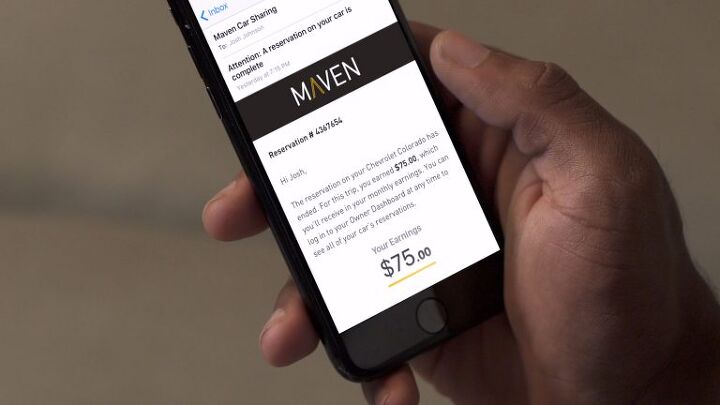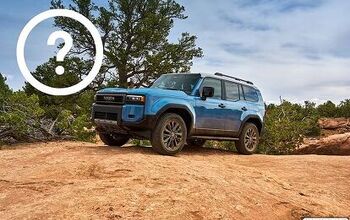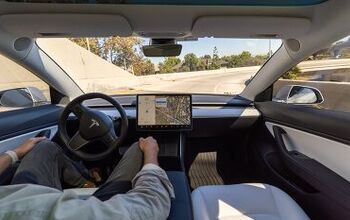An Experiment in Error? Maven Bites the Dust, GM Lauds 'Insights' Gained

The great General Motors ride-sharing experiment is over. At least for now. Maven, which hit parking lots in 2016 and eventually expanded into the nation’s driveways, was GM’s attempt to put its vehicles to work, rather than sell them to retail or fleet customers like some kind of dinosaur.
For a fee, users could access the GM-owned fleet of Maven products to perform random driving tasks. Short trips, mainly, in the absence of an Uber or Lyft ride or participation in a more formal car-sharing agreement. Tap that app, find the car, unlock it, and drive off. Abandon somewhere after you’re done.
Well, that’s what GM just did with Maven.
As reported by The Verge, the company sent out notices to users on Tuesday notifying them of the “immediate” suspension of the Maven experiment.
“After critically looking at our business, the industry, and what’s going on with COVID-19, we have made the tough but necessary decision to wind down our business,” the automaker wrote to its customers.
Maven services went offline in March due to the coronavirus pandemic, but today’s message confirms a permanent cancellation. GM’s efforts to insert Maven services into various American and Canadian cities came as the automaker explored new revenue streams in the dawning (and dazzlingly promising) Age of Mobility. Thing is, the windfalls promised by such business models have, for the most part, failed to materialize. Maven was not a money maker.
Despite the service’s expansion into other pilot projects, last year brought suggestions of trouble ahead.
In January 2019, Jill Steyn, who oversaw the launch and guided Maven through its first two-plus years, abruptly left the company. Before Steyn’s departure, the service had branched out with Maven Gig, a rental service providing vehicles to rideshare and delivery drivers. In 2018 came peer-to-peer carsharing, allowing owners of newer GM vehicles to earn money by renting out their rides to Maven customers. That service ultimately expanded to 10 cities.
Shortly before her departure, Steyn spoke of adding non-GM vehicles to the service.
Taking over from Steyn in February 2019 was Sigal Cordeiro, a 19-year GM veteran who formerly served as executive director of global product marketing for the automaker’s overseas GEM vehicle platform. Nothing new emerged from Maven after that point.
Partway through last year, Maven announced it was pulling its services from several large U.S. cities, among them New York City, Chicago, and Boston, signalling that the experiment may have gone as far as it could. The pandemic seems to have been the final straw.
In a statement published by The Verge, Pamela Fletcher, GM’s vice president of global innovation, said, “We’ve gained extremely valuable insights from operating our own car-sharing business.”
“Our learnings and developments from Maven will go on to benefit and accelerate the growth of other areas of GM business.”
General Motors would now like to have a word with you about the zero-percent/84-month financing available to eligible buyers.
[Image: General Motors]

More by Steph Willems
Latest Car Reviews
Read moreLatest Product Reviews
Read moreRecent Comments
- CanadaCraig As an aside... you are so incredibly vulnerable as you're sitting there WAITING for you EV to charge. It freaks me out.
- Wjtinfwb My local Ford dealer would be better served if the entire facility was AI. At least AI won't be openly hostile and confrontational to your basic requests when making or servicing you 50k plus investment and maybe would return a phone call or two.
- Ras815 Tesla is going to make for one of those fantastic corporate case studies someday. They had it all, and all it took was an increasingly erratic CEO empowered to make a few terrible, unchallenged ideas to wreck it.
- Dave Holzman Golden2husky remember you from well over decade ago in these comments. If I wanted to have a screen name that reflected my canine companionship, I'd be BorderCollie as of about five years go. Life is definitely better with dogs.
- Dave Holzman You're right about that!


































Comments
Join the conversation
Wow this place is full of some super unintelligent douchebags. It's like clique central for rtards and morons. Great job TTAC, you've done a great job killing this site!
I've been kinda considering a used Chevy Bolt EV. Recently, a metric buttload of them appeared all at once on the market in California -- only a year or two old and at bargain prices. But on closer inspection, they all had 100,000 miles and scratched-up rear door panels. Now it makes sense. My guess is, those are the Maven Gig cars. Maven Gig, GM's lease-by-the-day program, was very popular with rideshare drivers -- every Chevy Bolt EV they had in greater L.A. was reserved again the moment it reappeared on the map. Incidentally, they all seemed to have wound up at the faux-upscale lots that pepper California's Inland Empire. These lots peddle late-model cars at utterly irresistible prices. The catch is a) an accident history, disclosed or not, b) very high miles for the year, c) an undisclosed $3000 dealer fee that they try to hide in the paperwork, or d) all of the above. Word to the wise: avoid any place with Warehouse, Wholesale, or Direct in the name...it's a scam.